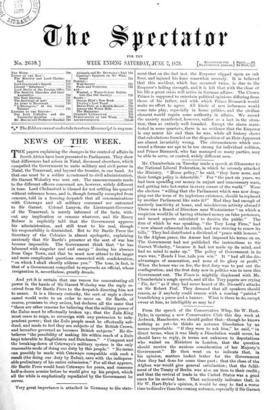And yet it is certain that one reason for concentrating
all power in the bands of Sir Garnet Wolseley was the reply re- ceived from Sir Bartle Frere to the despatch directing him not to annex. It is a literary curiosity, the sort of reply a clever camel would write to an order to move on. Sir Bartle, of course, promises to obey orders, but declares all the same that "there are other reasons for believing that the military power of the Zulus must be effectually broken up ; that the Zulu King must cease to reign, as sovereign with any pretension to inde- pendent power ; that the Zulu people must be effectually sub- dued, and made to feel they are subjects of the British Crown, and hereafter governed as becomes British subjects." He dis- believes "the possibility of making life within reach of a Zulu impi tolerable to Englishmen and Dutchmen." " Conquest and the breaking-down of Cetewayo's military system is the only reasonable mode of doing our duty by this people." No terms can possibly be made with Cetewayo compatible with such a result (the doing our duty by Zulus), save with the indispens- able preliminary of his entire submission." For all that appears, Sir Bartle Frere would hunt Cetewayo for years, and consume half-a-dozen armies before he would give up his project, which all the while is emphatically repudiated by the Government he serves.


































